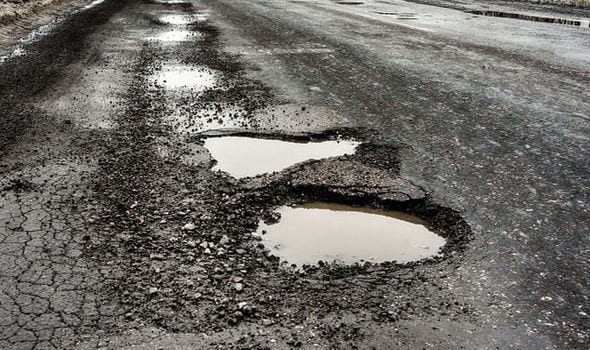- Relative to its population, Wrexham is the pothole capital of Wales
- City councils in Wales fix three in ten potholes, which is one less than the national average
- Glasgow has the highest number of potholes per capita of all cities in Britain
- London fared relatively well overall, though Barnet is worse than Glasgow, with 12 potholes per 1,000 residents
- Across Britain, city councils tend to fix only four in ten potholes
Wrexham is the pothole capital of Wales, according to new research. There is one reported pothole per 169 residents. In Britain, this title belongs to Glasgow, with one reported pothole for every 86th Glaswegian. Fix rates of reported potholes in Welsh cities is lower than the national average among cities in Britain. In Wales, only three in ten reported potholes are fixed, which is one less than the national average.
This is according to a new study from data collection experts at SmartSurvey, who analysed the reports of potholes registered via FixMyStreet.com for 69 cities across England, Scotland and Wales. Since some residents use the FixMyStreet platform more than others, fix rates were evaluated only for the cities with at least 100 reports registered since 2007, when the platform was launched, until January 29th, 2024.
Pothole capitals
Wrexham is the pothole capital of Wales. Over the past 13 years, the log of all reports on the site indicates that the local council has addressed only one in four reports of potholes. Today, the 135,117 locals still cope with 795 potholes across the city.
Swansea ranked second-worst city in Wales for pothole issues. There are still 1,196 potholes marked as unfixed in the city, with the council having previously addressed 383 potholes reported on the FixMyStreet platform. Considering the city’s population, this earned Swansea a spot in Britain’s overall top ten pothole capitals.
Cardiff has the most potholes of all Welsh cities. When measuring relative to the city’s population, it was the third worst, counting one reported pothole for every 210 residents. Drivers currently face 1,725 potholes every day. The council tends to fix every third pothole reported.
Among all the cities in Britain, Glasgow has the highest number of reported potholes relative to its population. Since 2007, Glaswegians filed 9,780 reports of potholes, of which only 2,372 had been marked as “fixed” until January 12th this year. The remaining 7,408 reports are spread rather evenly across the entire city of 635,130 inhabitants. This is the equivalent of 11.7 yet unfixed reported potholes for every 1,000 residents. The local authorities have a 24.25% fix rate when it comes to pothole reports.
The region with the most city potholes per capita is South Scotland. On average, one should expect to spot a pothole once for every 211 inhabitants. This drives up the statistics for the whole of Scotland, making it the worst country for unresolved city-road pothole complaints.
Top 10 Pothole Capitals in Britain
| # | City | Potholes unfixed per 1,000 residents | Fix rate (%) |
| 1 | Glasgow | 11.7 | 24.25 |
| 2 | Edinburgh | 8.2 | 22.25 |
| 3 | Hereford | 7.9 | 50.24 |
| 4 | Southampton | 7.3 | 31.65 |
| 5 | Wrexham | 5.9 | 26.93 |
| 6 | Stoke-on-Trent | 5.7 | 37.28 |
| 7 | Sheffield | 5.5 | 37.73 |
| 8 | Manchester | 5.4 | 19.18 |
| 9 | Birmingham | 5.1 | 24.07 |
| 10 | Swansea | 5.0 | 24.26 |
Barnet is the pothole capital of London
London fared relatively well overall, averaging 1.7 reported potholes per 1,000 residents. Across the 32 boroughs and the City of London, Barnet was, by far, the absolute worst not only in London, but in Britain. With 4,656 reported potholes as at January 29th, 2024, Barnet averages to 12 potholes per 1,000 residents, which is even worse than Glasgow. At quite the distance, the next worst areas in London are Richmond and Kingston, with 2.6 potholes reported per 1,000 residents each.
As for fix rates, among areas with at least 100 reported potholes, Lewisham council is easily the most responsive: they fixed 98.45% of the reported potholes. It is followed by the City of London (94.34%) and Bromley (91.21%). The most unresponsive councils with regards to fixing potholes are Westminster (4.17%), Hammersmith and Fulham (19.48%), Tower Hamlets (20.14%) and Barking and Dagenham (20.30%).
Overall, London counts 14,593 reported potholes still marked as unfixed. Another 11,572 potholes have been resolved. This means that the fix rate for potholes in London is 44.23%, thus less than half the reported potholes get fixed. On average, there are 1.7 potholes reported per 1,000 residents.
Top 10 Pothole-Riddled Boroughs in London
| # | City | Potholes unfixed per 1,000 residents | Fix rate (%) |
| 1 | Barnet | 12 | 32.36 |
| 2 | Richmond upon Thames | 2.6 | 28.61 |
| 3 | Kingston upon Thames | 2.6 | 43.38 |
| 4 | Croydon | 2.5 | 33.87 |
| 5 | Bexley | 2.4 | 63.56 |
| 6 | Lambeth | 2.3 | 36.32 |
| 7 | Hillingdon | 2.1 | 22.79 |
| 8 | Brent | 2.1 | 39.24 |
| 9 | Islington | 2.0 | 43.38 |
| 10 | Enfield | 1.9 | 34.43 |
Most Responsive City Councils
City dwellers across Britain filed almost 100,000 pothole reports on the FixMyStreet platforms. Councils tend to fix only four in ten potholes, based on average rates in cities with the most proactive residents. As at January 29th, 2024, 60,825 reported potholes across all of Britain’s cities are still marked as unfixed. The fix rate in Wales is lower, with city councils currently fixing only 29.39% of all reported potholes.
Bath authorities are the most responsive city council in Britain when it comes to addressing pothole issues. Residents appear to have started reporting potholes online from 2018, 97.77% of which were fixed. Of the 719 potholes registered over the past six years in Bath, only 12 remained unresolved as at January 12th, 2024. There is currently only one pothole for every 5,838 Bath residents, in a city of 95,000 inhabitants.
Inching closely behind with an impressive fix rate of 93.89%, Peterborough authorities are Britain’s second most responsive city council. Peterborough residents are some of the most proactive city dwellers in the country, and local authorities appear happy to oblige. This medium-sized city in Eastern England, with 215,673 inhabitants, dealt with 2,242 potholes reported over the past 17 years. Only 137 of them remained unfixed as at January 12th, 2024.
Nearly half a million people live in Bristol. They started reporting pothole issues online in 2017. Until January 12th, 2024, the council had addressed four in five of these reports. This is the third-highest response rate of all cities in Britain. Bristolians registered 1,420 pothole issues over the past seven years, of which 297 remain unaddressed to date.
Top 10 Most Responsive Local Authorities
| # | City | Fix rate of potholes % | Total reported potholes |
| 1 | Bath | 97.77 | 719 |
| 2 | Peterborough | 93.89 | 2242 |
| 3 | Bristol | 79.08 | 1420 |
| 4 | Truro | 64.46 | 121 |
| 5 | Durham | 62.40 | 125 |
| 6 | Wakefield | 57.75 | 1820 |
| 7 | York | 53.91 | 1035 |
| 8 | Hereford | 50.24 | 846 |
| 9 | Nottingham | 41.94 | 341 |
| 10 | Brighton & Hove | 40.60 | 734 |
Mo Naser, SmartSurvey CEO, comments: “One could argue that bigger cities have more issues to attend to, but they also have bigger budgets and more staff to deal with them. For instance, Truro is a tiny cathedral city, but the council fixes two in three reported potholes. This is the fourth-highest response rate of all the cities with at least 100 reports registered on the FixMyStreet platform.
“Bristol, on the other hand, is the tenth biggest city in the UK, yet the authorities have managed to fix four in five reported potholes. Bath and Peterborough councils excel at responding to pothole issues. Why do Bath, Peterborough, Bristol and Truro, whose populations and filed reports vary so widely, succeed while cities of comparable sizes to each of them struggle?”
The study was conducted by SmartSurvey, a leading UK digital surveying platform.

| [donate]
| Help keep news FREE for our readersSupporting your local community newspaper/online news outlet is crucial now more than ever. If you believe in independent journalism,then consider making a valuable contribution by making a one-time or monthly donation. We operate in rural areas where providing unbiased news can be challenging. |



















